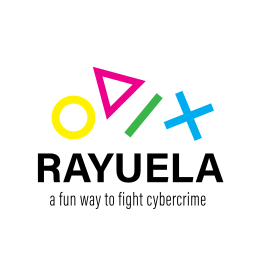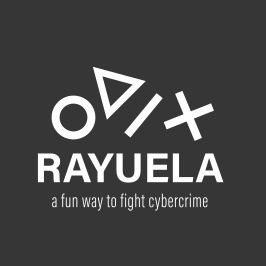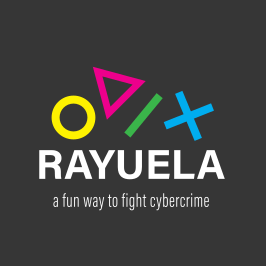Story identity of RAYUELA project was created according to the basic mission of the project, to empower and educate young people (children and teenagers primarily) in the benefits, risks and threats intrinsically linked to the use of the Internet by playing, thus preventing and mitigating cybercriminal behaviour. Our ideas stand a common belief that the internet has become an integral part of children and young people’s lives. The increased time spent online is prompting questions about whether they are in control of their internet usage. RAYUELA’s main goal is to better understand the drivers and human factors affecting certain relevant ways of cyber criminality, as well as empower and educate young people
The Acronym of the project “Empowering and education young people for the internet by playing” was given the title RAYUELA, a Spanish word meaning Hopscotch in English.
“Hopscotch (rayuela) is played with a pebble that you move with the tip of your toe. The things you need: a sidewalk, a pebble, a toe, and a pretty chalk drawing, preferably in colours. On top is Heaven, on the bottom is Earth, it’s very hard to get the pebble up to Heaven, you almost always miscalculate and the stone goes off the drawing. But little by little you start to get the knack of how to jump over the different squares and then one day you learn how to leave Earth and make the pebble climb up into Heaven”
Julio Cortázar, Rayuela, 1963
So the Heaven of our Rayuela project is none other than contributing to make the Internet a safer and better place for children. Our contribution lies in the empowerment and education of young people to combat negative threats by “playing them out of their daily lives”.
A fun way to fight cybercrime was the sentence that was elaborated further and incorporated also in the second logo proposal for RAYUELA project. Our intention was to connect it to the world of childhood, with familiar signs that were visible through various generations playing games all over the world, and societies. As in every game you must select your preference steps, and simple geometric symbols lead you to the direction, it might be right and even wrong. It’s life, it’s up to you, which way you will go, if you choose yes or no, but it all depends on your skills and knowledge. Every obstacle is surpassable.
The series of graphics symbols were developed by Bratislava Policy Institute to represent the RAYUELA project in general, and to represent the main core idea of it “a fun way to fight cybercrime”. We were influenced by the main popular gaming consoles in the world that use similar symbols (Playstation, XBox, Nintendo, Game Boy, Dreamcast, Sega, and others). The symbols are incorporated into the storyline of the whole RAYUELA logo, and it’s up to the “player” which way he/ she is choosing the connected online environment.
The core values of RAYUELA project and project consortium are fundamental, deeply integrated principles that guide all of our actions and they are serving as our cultural cornerstones. Simply say RAYUELA values are those things that we care most about. RAYUELA brand core values are the guiding principles that drive our project culture and our connection outside to the world. Our values are empowering us to act, to stand for action to make the internet safe for our childrens and young people.
Empathy: RAYUELA logo is representing generosity and understanding. It recognizes the solidarity and humanity in others in the online world.
Playfulness: RAYUELA logo represents an open and creative mind, that is looking at the world with curiosity. Playing well with others and providing a receptive experience to users.
Education: RAYUELA logo represents contextual thinking and provides educational solutions to fight cybercrime.
Unity: RAYUELA logo represents cooperation and it takes the interests of all into account. It is celebrating harmony and a sense of community among those who fight cybercrime.
Summary and goals
The internet has become an integral part of children and young people’s lives. The increased time spent online is prompting questions about whether they are in control of their internet usage. The low level of awareness of cyber threats and their potential impact is a serious issue that translates into the proliferation of incidents due to human mistakes. 51% of EU citizens feel not at all or not well informed about cyber threats and 86% of Europeans believe that the risk of becoming a victim of cybercrime is rapidly increasing. On the other hand, Law enforcement has noted that more and more teenagers and young people are increasingly committing cybercrimes. This is an international problem which has considerable cost implications; it is estimated that crimes in cyberspace will cost the global economy $445B annually. Understanding the behavioural and developmental aspects of cyber criminality is becoming increasingly important and underlies the necessity of a shift in focus from sanctions to deterrence and prevention.
As a research project, RAYUELA aims to bring together law enforcement agencies (LEAs), sociologists, psychologists, anthropologists, legal experts, computer scientists and engineers, to develop novel methodologies that allow better understanding the factors affecting online behaviour related to new ways of cyber criminality, as well as promoting the potential of these young talents for cybersecurity and technologies.
RAYUELA’s main goal is to better understand the drivers and human factors affecting certain relevant ways of cyber criminality, as well as empower and educate young people (children and teenagers primarily) in the benefits, risks and threats intrinsically linked to the use of the Internet by playing, thus preventing and mitigating cybercriminal behaviour.
Challenge
The RAYUELA project focuses on cybercrime, which has a significant cross-border impact among the EU countries, but also outside the EU. Specifically, the proposal is addressed to cybercrime related to children, teenagers and young adults, which happen to be one of the most vulnerable populations in the EU, who must be protected and nurtured to stay safe online. RAYUELA proposes a series of solutions to help the EU in the prevention, investigation and mitigation of cybercrime related to online grooming, cyberbullying and human trafficking, while incorporating the perspective of gender and cultural diversity. Moreover, one of the main issues to be tackled in RAYUELA will be the defence of fundamental rights, especially the right to privacy online. The project brings together key stakeholders to secure the impacts at EU level and beyond
Work packages
WP1 – Building a knowledge base on cybercrime drivers for children and young adults: preliminary research on main drivers for cybercrime among the young. Understanding both pathology and physiology of online behaviours. Characterization of the victims and offenders of the considered ways of cybercriminality, as well as of the modus operandi.
WP2 – Technology assessment and IT threat landscape: technology baseline for the evaluation of current threats and vulnerabilities. Characterization of user interactions with technology and connected devices.
WP3 – Development of a cyberadventure serious gaming environment: a new and personalised serious gaming strategy and environment to obtain information in a userfriendly, non-invasive way via game dynamics.
WP4 – Online privacy, data security and ethics: study of the ethical and legal implications linked to research with minors, sensitive data collection, analysis and exploitation. Compliance mechanisms to ensure privacy and data security. Open Data management.
WP5 – Gathering insights via pilot studies across the EU: large-scale pilot studies with children and young adults to collect and monitor data on users’ behaviour and actions online through the gaming apps.
WP6 – Data analysis and interpretation on profiles from potential young victims and offenders: Data science algorithms (traditional supervised and unsupervised Machine Learning algorithms, Bayesian Multilevel Regression, Deep Learning algorithms) on collected data to identify patterns for profiling and analysis of online habits from potential young victims and offenders.
WP7 – Communication, dissemination and capacity building for cybercrime prevention and awareness: communication and dissemination actions for the project and its accomplishments, both within the participating institutions and beyond, in order to facilitate prevention of cybercrime and foster awareness among the youth through educational materials.
WP8 – Project management: management and reporting tasks for a successful implementation, including project coordination activities, quality assurance and risk management.
Partners
Research and academia: COMILLAS, project coordinator, with wide background in psychology and anthropology, as well as strong expertise in complex system modelling, gaming development and data analysis; UPM, with strong knowledge on IoT and cybersecurity; TECNALIA, specialists on serious games and gamification strategies; BPI, policy experts, specialists in qualitative research for societal threats; TARTU, experts on ethics, criminology, legal and privacy issues; and UGENT, with wide expertise in criminology and psychology.
Law Enforcement Agencies (LEAs): PJ, PLV, PSNI and EPBG which will bring their expertise on cybercrime investigation and early detection in radicalisation matters to the project.
SMEs and large industry: TIMELEX will act as a legal and GDPR expert for the project. The company will also manage privacy and data security issues; TILDE will develop machine translation engines for the project and will be responsible for Open Data management; ZABALA will provide support to all project management efforts, while also contribution to the definition and execution of the communication and dissemination strategy; and NEC, one of the leading organisations in the areas of AI and deep learning.
Educational institutions and associations: EA, UCLL and ALLDIGITAL will actively cooperate in the planning, recruitment, engagement and execution of RAYUELA’s pilot studies in supervised environments, through the setup of supervised testing groups of children and teenagers to play and interact with RAYUELA’s serious game.


